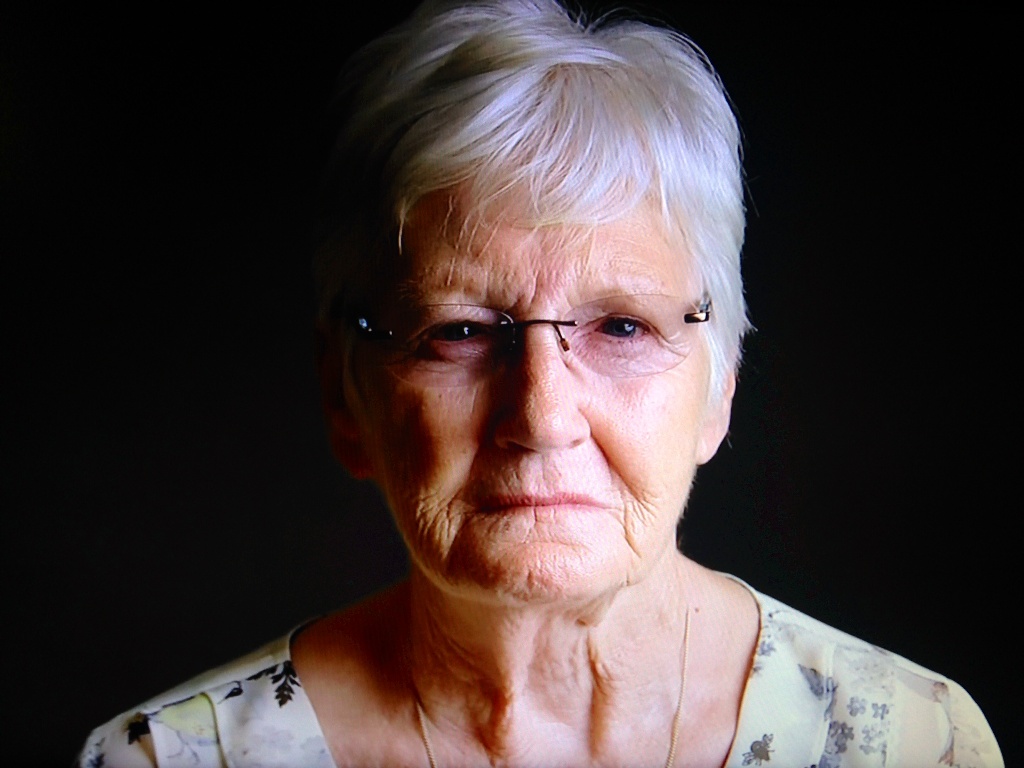MOVIE REVIEWS |
INTERVIEWS |
YOUTUBE |
NEWS
|
EDITORIALS | EVENTS |
AUDIO |
ESSAYS |
ARCHIVES |
CONTACT
|
PHOTOS |
COMING SOON|
EXAMINER.COM FILM ARTICLES
||HOME


Friday, April 18, 2014
MOVIE REVIEW
Hillsborough (2014)
Decades Of Pain Times 96 And A Shaky Road To Justice

Doreen
Jones, who lost her son Richard on April 15, 1989, in Daniel Gordon's
documentary "Hillsborough".
ESPN Films
by
Omar P.L. Moore/PopcornReel.com
 FOLLOW
FOLLOW
Friday,
April 18,
2014
Twenty five years ago this week the Hillsborough Stadium
disaster in Sheffield, England claimed the lives of 96 fans of Liverpool
Football Club. Those fans were crushed to death due to overcrowding by
police during the 1989 FA Cup Semi-Final match between Liverpool and Nottingham
Forest. The worst event in British sports history is chronicled to
disturbing, heartbreaking effect by filmmaker Daniel Gordon through distressing
video footage of the fatalities in his documentary "Hillsborough". (A 1996
namesake docudrama is also highly recommended viewing, as is the 2013 BBC
Panorama documentary
"Hillsborough: How They Buried The Truth".)
Mr. Gordon, himself a Sheffield Wednesday Football Club fan (he was
coincidentally born on a Wednesday and in Sheffield no less), expands
"Hillsborough" into a stirring, painful and horrific anatomy of institutional
corruption, willful failure and complicity. Yet most of all "Hillsborough" is
moving advocacy storytelling which seeks to correct the record and perception the
world had of that tragic April 15th day. As such, the film becomes, whether
intentionally or not, a quiet drumbeat for justice voiced through on-camera
recollections by several members of the bereaved families. Their pain is
unbearable to process as they recall what the South Yorkshire Police, the
British press (notably The Sun) and numerous politicians did to
perpetuate a grievous, appalling lie, blaming the dead for causing their own
fates.
The architecture of "Hillsborough" is class tensions, safety last-money first
business interests, police incompetence and indifference, and upper-crust
politicians who slandered Liverpool fans as hooligans and criminals conveniently
for establishment-absolving. The heart of "Hillsborough" though, is in the
resolve and determination of the families it portrays as they pursue wrenching
decades-long efforts to clear their deceased's names and achieve justice for
them. "We should have walked out right then! But we didn't," one
family member says, after a second government-appointed Hillsborough investigator,
Lord Justice Stuart, mocks Liverpool fans just prior to a meeting with the
families.
The South Yorkshire Police has its share of culpable officials, whom to this
date have not been held civilly liable or criminally prosecuted for the 96
deaths. Some police manipulated fellow officer and fans' eyewitness
statements, altering them to shine the best light on police and the worst on the
dead. This was after most police simply stood and watched people die in
the Hillsborough stands. It is this double outrage and second death that Mr. Gordon
outlines in a cool yet damning and dispassionate way. Professor Phil Scraton is the film's sobering anchor,
a key investigatory punctuation mark to
what are renewed and still-ongoing inquiries which began late last month.
Somberly told, "Hillsborough" operates successfully and achieves its great
effect on many levels as a keen, powerful and all-encompassing elegy to 96
people who should still be alive today. Mr. Gordon's documentary gives
sports and non-sports fans alike a window into passion for the global game of
football, the pride of the city of Liverpool, the excitement of the atmosphere
of a big match, the machinery of how an old football stadium with a prior
history of crowd-crush problems was ignored, poorly organized and mismanaged by
police, Sheffield Wednesday officials and the Football Association.
"Hillsborough" is an uncomfortable but necessary look at how a system betrays
the very people it is supposedly in place to protect, in an era where crowd
control meant more to police than crowd safety. Its greatest power is in
the grass-roots activism and campaigning of the families who lost
everything and are very slowly getting a little closer to the justice they thought they'd never
see.
Note: "Hillsborough", part of ESPN's "30 For 30
Soccer Stories" series, will be shown in the United States on ESPN2 cable
television on Sunday, April 20 (at 7pm Pacific/10
Eastern) and Monday, April 21 (at 6pm Pacific/9 Eastern).
"Hillsborough" contains highly disturbing images and
accounts about the fateful day of April 15, 1989 and its aftermath. Its
running time is one hour and 45 minutes.
COPYRIGHT 2014. POPCORNREEL.COM. ALL RIGHTS RESERVED.  FOLLOW
FOLLOW
MOVIE REVIEWS |
INTERVIEWS |
YOUTUBE |
NEWS
|
EDITORIALS | EVENTS |
AUDIO |
ESSAYS |
ARCHIVES |
CONTACT
| PHOTOS |
COMING SOON|
EXAMINER.COM FILM ARTICLES
||HOME


 FOLLOW
TWEET
FOLLOW
TWEET FOLLOW
FOLLOW